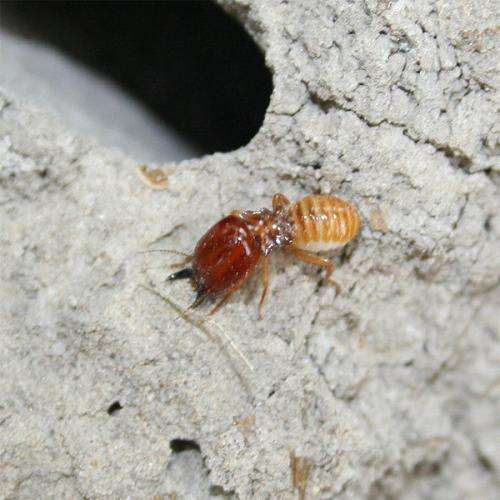This article has been reviewed according to Science X's editorial process and policies. Editors have highlighted the following attributes while ensuring the content's credibility:
fact-checked
peer-reviewed publication
reputable news agency
proofread
As climate gets hotter, the termites get hungrier, study finds

Here's something that will send a shiver up the spine of anyone who has battled termites—meaning just about every homeowner in Florida.
Termites get hungrier as temperatures get hotter, according to a new study, with their appetites for wood somehow whetted by rising temperatures.
That finding comes from more than 100 researchers across six continents who measured how fast termites ate blocks of dead wood left outside for at least a year in different regions with varying temperatures and rainfall.
The results were eye-opening, said Amy Zanne, a University of Miami biology professor who led the study. They also underline why warm South Florida is so inviting for such termites. In the study, termites living at sites averaging 86-degrees ate wood seven times faster than in cooler environments averaging 68 degrees. So increasingly hotter days driven by climate change likely means increasingly hungrier termites—in South Florida and elsewhere.
"Nobody has measured that high of a value, so we kept recalculating and checking," said Zanne, who is the Aresty Chair in Tropical Ecology at UM. "It was surprising how sensitive they are to temperature."
Most termites aren't pests
One note: The research study published in Science in 2022 actually focused on termites in the wild not the pests that move in uninvited and swarm in South Florida homes, causing costly damage and demanding expensive eradication treatments. In fact, less than 4 percent of the 3,000 known termite species are pests that give the rest of them a bad rap. The majority of termites contribute to the natural ecosystem, scientists say, nourishing the soil and breaking down dead material so new life can flourish.
"They're also fascinating organisms because they have the social structure that allows them all to cooperate to make these incredibly high mountains," Yatzo said.
Still, though the bugs munching your wall studs and window sills weren't the focus of the study, Zanne and other researchers say it is fair to surmise that temperatures impact pest species in Florida much the same way. They too likely will pick up their pace eating wood in homes and businesses as climate pushes the mercury higher.
Researchers still don't know why exactly the termites eat so much faster in higher temperatures. It could just be how enzymes and their guts respond to heat, similar to how human hearts pump faster and metabolism speeds up in rising temperature.
But Zanne's research indicated termites are particularly responsive to heat. Her work compared the rate of termite eating to how fast microbes, such as fungi and bacteria, decompose dead wood in different environments. While the fungi and bacteria also sped up twofold in hotter temperatures, termites still took first place.
Climate change could impact termites in other ways as well. Some species could soon migrate north and south toward once cooler areas. With warming shifts to tropical climates, wood decay also will likely increase as termites access more areas of the world, the study indicates.
"They are accelerating the decomposition of wood in areas where that didn't have termites so in that sense that are likely expanding and they are increasing their CO2 fingerprint," said Oscar J. Valverde-Barrantes, an FIU assistant professor who conducted the experiment in Miami.
Termite farts: An impact on climate?
There is also increasing research on how termites themselves might exacerbate climate change.
Termites, similar to cows, have microbes or bacteria inside their bodies that break down carbons during digestion. And like cows, termites fart—releasing gas in the form of methane and CO2.
While termites are tiny, there are an awful lot of them—a biomass that could be on par with humans or with cows, said Zanne. And their diet, wood, is an understudied storehouse of carbon, she said.
"So, if you think about the CO2 that we are releasing, that cows are releasing—termites are probably equivalent," Zanne said.
That would be a lot of emissions. Cattle, for example, make up an estimated 14.4 percent of global greenhouse emissions, which contribute to climate change. It is still unclear, however, how much termites contribute to the global carbon footprint overall.
Studying how termites and decomposition of wood contributes to the global carbon cycle is a slow process and the science is complex. Just because termites emit methane, for instance, not all that gas actually makes it into the atmosphere. Termites often stay low to the ground which locks away carbon in the soil for longer. Another complication is that a bacteria in termite mounds, called methanotrophs eat up some of the methane in the process.
"One of the things that's tricky about termites is taking it in the context of everything else that is happening," said Abbey Yatzo, a UM doctoral student in Zanne's lab, said. "A lot of the research about termites and understanding the role in the global methane budget is understanding the balance between what's getting released, what's getting mitigated, and what is actually entering the atmosphere."
Yatzo is conducting an experiment in Australia to measure the amount of CO2 and methane released from termite mounds to understand more about that balance.
Journal information: Science
2023 Miami Herald.
Distributed by Tribune Content Agency, LLC.


















